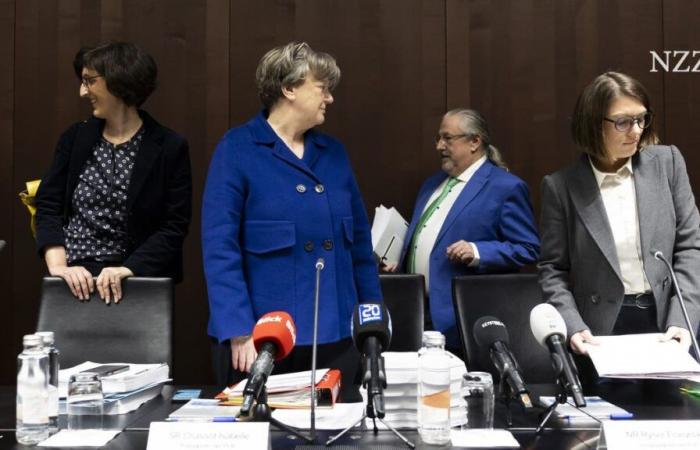For a year and a half, a commission investigated the events surrounding the merger of Credit Suisse with UBS. She will present the results on Friday morning.
The most important thing in brief:
- The Parliamentary Commission of Inquiry (PUK) presents the report on the takeover of Credit Suisse at a press conference.
- The report shows in detail on 569 pages, how the emergency merger of CS with UBS came about and provides insights into the behavior of the central actors. The focus of the report is on the Finance Department (EFD), the National Bank (SNB) and the Financial Market Supervisory Authority (Finma).. To the report
- The finance department under the leadership of former Federal Councilor Ueli Maurer is the most heavily criticized in the report. He has delayed the provision of liquidity support that is intended to stabilize banks in the event of a crisis. He suggested that the Federal Council not introduce this instrument until 2022, when the CS was already close to its end.
- The report also criticizes Finma President Marlene Amstad. Although Finma did a lot before the acute crisis, it achieved little on the crucial issues.
- The report further shows how close the emergency merger with UBS was in the end. CS haggled with UBS over the terms of the takeover until the last few minutes. We are talking about a “poker game”.
NZZ.ch requires JavaScript for important functions. Your browser or ad blocker is currently preventing this.
Please adjust the settings.
11.55 a.m.: How did the communication between CS and Finma go?
The Green Liberal National Councilor Beat Flach answers the question of whether Finma has sufficiently fulfilled its supervisory duties at Credit Suisse. The PUK comes to the conclusion that Finma did not intervene strongly enough, he says.
The president of the commission, Isabelle Chassot, further says that she does not agree with a journalist’s claim that Finma can be accused of “flagrant failure”. But from the PUK’s point of view, Finma was not able to assert itself sufficiently against the CS.
11.34 a.m.: What was the Federal Council’s Plan B?
A journalist asked what points the PUK could not clarify in the report. Vice President Franziska Ryser said that it was not clear to the commission what plan B the Federal Council would have pursued if the emergency merger of CS with UBS had not taken place.
From the PUK’s perspective, the takeover of Credit Suisse by a foreign bank could have represented another, longer-term option. This would have been a good option in terms of competitive conditions in Switzerland, says Commission Vice-President Franziska Ryser.
11:23 a.m.: Was Maurer the “main culprit”?
A journalist asks whether Ueli Maurer could be described as the main culprit. Isabelle Chassot says it is not the PUK’s job to look for culprits on a personal level. The commission will also not make any demands for resignation. In addition, the PUK report shows that the main responsibility lies with the management of the CS, says Chassot.
PUK leader Isabelle Chassot says it is not the commission’s job to look for culprits on a personal level.
Peter Klaunzer / Keystone
11.10 a.m.: PUK makes 20 recommendations for action
Ryser addresses some of the 20 recommendations for action that the PUK demands. First, the conflict of objectives in the “too big to fail” legislation should be clarified. The Federal Council must then further develop the legislation and take the risk for taxpayers into account. In addition, systemically important banks should follow a remuneration system that does not create false incentives.
11:06 a.m.: Ryser on the last days of CS
The Green National Councilor and Vice President of the Commission, Franziska Ryser, comments on the acute crisis caused by the end of Credit Suisse. This began on March 15, 2023. The goal was to save the CS by the weekend, says Ryser. The negotiating positions were very far apart. The FDF and the National Bank have played a very active role these days. They acted as intermediaries between the two banks. The PUK notes that three options were available on Sunday, March 19: a takeover, a merger and a temporary nationalization of Credit Suisse.
The PUK considers the chosen takeover solution to be legal given the circumstances, says Ryser.
10:51 a.m.: PUK criticizes Ueli Maurer
Early detection of the crisis at the Federal Council level did not work, says GLP National Councilor Beat Flach. Former Finance Minister Ueli Maurer is heavily criticized in the report. In the years before the end of Credit Suisse, Maurer, as head of the finance department, failed to comprehensively inform his Federal Council colleagues about the critical state of Credit Suisse, the report says. Maurer only informed the entire Federal Council orally and thereby partially violated his legal duty to provide information. For the PUK it was incomprehensible that Maurer had forgone written documents, said SP National Councilor Roger Nordmann.
Maurer initially did not want to comment on the criticism, as he told the SDA news agency on Friday. He wanted to check the report first.
10:40 a.m.: Key findings of the report
Chassot says the commission adopted the report unanimously. The investigation confirms that responsibility for CS’s difficulties in recent years lies with the bank’s management. Nevertheless, the PUK also caused problems for the authorities:
- The legal framework: Chassot addresses the “too big to fail” rule. The government has failed to further develop the rules for winding up big banks.
- management of the authorities: Finma carried out its work intensively, but not always effectively, says Chassot. In addition, the Finance Department, the National Bank and Finma did not communicate sufficiently with each other.
“Axel, plain language: The value of CS shares is zero”: The PUK report documents the chaotic time before the emergency takeover of Credit Suisse
10:35 a.m.: 18 months of work, 30,000 documents
Chassot introduces the members of the investigative commission. With the exception of FDP Councilor of States Andrea Caroni, all members of the commission are present. The PUK’s work lasted 18 months. The commission would have analyzed 30,000 documents during this time. She also conducted 79 hearings with 62 people.
10.30 a.m.: Start of the press conference
The president of the parliamentary investigative commission (PUK), the centrist Councilor of States Isabelle Chassot, presents the findings on the emergency merger of Credit Suisse with UBS.
The PUK will present its 500-page report on the takeover of CS on Friday.
Peter Klaunzer / Keystone
The most important questions and answers
In March 2023 everything suddenly happened very quickly. In just five days, Finma, SNB, the management teams of CS and UBS and the Federal Council arranged for UBS to take over Credit Suisse. It was the end of Credit Suisse.
Normally the merger law regulates such a takeover. The merger will only come about if two thirds of the share votes present at the general meetings of both companies vote in favor of it. In that March, however, the Federal Council issued an emergency decree that no resolution by the general meetings was necessary in the event of a merger of systemically important banks. The previously unimaginable merger of the two major Swiss banks became reality.
A few weeks later, parliament decided to set up a parliamentary investigative commission (PUK) to investigate the emergency takeover of CS by UBS. The PUK presented the results on Friday.
What did the PUK investigate?
The PUK started work in July 2023. The commission’s task is to investigate the role of the authorities. The commission examined events from 2015 onwards, when Tidjane Thiam was still head of Credit Suisse.
The Commission should clarify whether the authorities have fulfilled their obligations during this period. The subject of the investigation was therefore “the management of the Federal Council, the Federal Administration and other bodies responsible for federal tasks in connection with the merger”. Specifically, this is about the cooperation between Finma, the National Bank and the Ministry of Finance.
The PUK had many questions: Did Finma fulfill its supervisory obligation? Did the former Finance Minister Ueli Maurer inform the Federal Council in a timely manner about Credit Suisse’s difficulties? Should the authorities have intervened as early as autumn 2022, when more than 80 billion in customer money flowed out of CS?
However, the PUK will not be able to provide a complete picture of the CS’s demise. So she didn’t investigate what was happening internally at Credit Suisse. That is not within their competence.
Illustration Simon Tanner / NZZ
Who is part of the PUK?
According to the law, Parliament can set up a parliamentary commission of inquiry “if incidents of major consequence require clarification”. Such a commission is considered Parliament’s strongest lever to control the executive branch.
The PUK consists of fourteen members – seven from the National Council and seven from the Council of States. Part of the commission includes, among others, the SP Council of States Daniel Jositsch and the Green National Councilor Franziska Ryser. The centrist Councilor of States Isabelle Chassot is the president of the commission.
Which people are the focus of the investigation?
It is not yet known which actors the PUK questioned during the investigation. Commission President Isabelle Chassot has been very reticent to provide information about the work of the PUK during the year and a half. All that is officially known is that the top authorities involved in the emergency merger have been questioned. Finma President Marlene Amstad, for example, is likely to be the focus of the investigations. Amstad’s future as Finma president depends on the PUK report.
At the end of August, the “Tamedia” newspapers also reported on secret meetings between the former finance minister Ueli Maurer, the former president of the National Bank Thomas Jordan and Axel Lehmann, the last president of Credit Suisse.
What can we expect from the report?
The PUK’s task is to report any responsibilities and institutional deficiencies to Parliament. It should also suggest measures to remedy this. What exactly the PUK will present on Friday is unclear. The commission is subject to a duty of confidentiality and the content of the report is top secret.
Since the end of Credit Suisse, politicians have been discussing reforming the “too big to fail” regime at big banks. However, the Federal Council and Parliament wanted to wait for the PUK report to be published before initiating the reform process.






